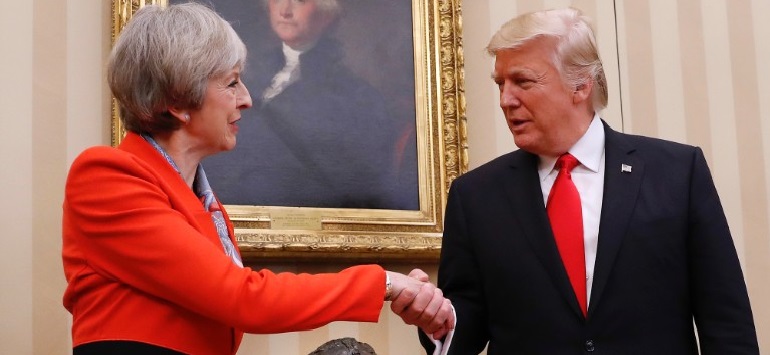UK in favor of nuclear deal
October 11, 2017 | Expert Insights

UK Prime Minister Theresa May has urged US President Donald Trump to recertify the nuclear deal with Iran.
Background
Iran is the second-largest country in the Middle East. Previously known as Persia, the modern Islamic republic came into existence in 1979 after a revolution. Iran is a signatory of the Non Proliferation Treaty. However reports emerged in 2000s of the nation running an uranium enrichment program without the knowledge of the international community. After the IAEA (International Atomic Energy Agency) confirmed the reports, the UN imposed harsh sanctions on the region. This crippled its trade with nations across the world including Europe. This cost Iran billions of dollars (estimated $100 billion in oil revenues alone till 2015). Iran has the fourth largest proven oil reserves in the world.
On 2 April, 2015, the P5+1 and Iran reached a provisional agreement that sought to lift most of the sanctions in exchange for limits on Iran's nuclear programs extending for at least ten years. When the International Atomic Energy Agency (IAEA) certified that Iran had restricted its sensitive nuclear activities, the UN sanctions were lifted on January 16, 2016. For more details on the nuclear program, click here.
Prior to 2012, when the EU imposed an oil embargo on the region, Iran was the seventh largest provider of oil to the EU. A Eurostat report stated that 27 European states imported 11.4 billion Euros of goods from Iran in the first nine months of 2011. Even though the two regions do not have any bilateral treaties (as Iran is not a WTO member nation), crude oil exports are worth billions of Euros. The European Commission welcomed the nuclear deal as it could resume importing oil from Iran. Additionally, Iran’s exports of hot-rolled non-alloy iron and steel to the EU in 2016 earned Iran around $66 million. In July, Iran signed a $4.8 billion deal with France's Total.
Analysis
The future of the nuclear deal has become uncertain in 2017. US President Donald Trump has been highly critical of the agreement. According to reports, he is expected to notify the US Congress by October 15th that he will be decertifying the deal. However, Europe is strongly in favor of continuing the deal. Countries like France have argued that the deal must be adhered to as the IAEA has confirmed that Iran is complying with the rules stated in the deal. Additionally, in July 2017, EU’s foreign policy chief Federica Mogherini said that the EU has a responsibility to ensure the deal is implemented. She said, “The nuclear deal doesn’t belong to one country, it belongs to the international community. We have the responsibility to make sure that this continues to be implemented.” Germany has also spoken strongly in favor of the deal.
In a bid to sway his opinion, UK Prime Minister, Theresa May has reportedly spoken to Trump in favor of continuing the deal. “The PM reaffirmed the UK’s strong commitment to the deal alongside our European partners, saying it was vitally important for regional security,” a Number 10 spokesman said. The statement added, “The PM stressed that it was important that the deal was carefully monitored and properly enforced. Mrs May and the president also discussed the need for the UK, US and others to work together to counter destabilizing Iranian activity in the region. The PM and president agreed that their teams should remain in contact ahead of the decision on recertification.”
UK Foreign Secretary Boris Johnson also spoke to the US Secretary of State, Rex Tillerson to sway the administration’s agenda. Shortly after his call, Johnson said, “We have made no bones about our deep concern at Iran’s destabilising regional activity, including its ballistic missile programme, but I remain steadfast in my view that the nuclear deal was an historic achievement that has undoubtedly made the world a safer place. It was the culmination of 13 years of painstaking diplomacy and has increased security, both in the region and in the UK. It is these security implications that we continue to encourage the US to consider.”
If the US President does decertify the deal, then the Congress will have 60 days to decide on whether it will impose sanctions on Iran.
It was confirmed by the European Climate Action and Energy Commissioner Miguel Arias Canete in April 2017, that Iran’s exports to the European Union had increased by over 300 percent since the deal was signed. Additionally, nations are also concerned that if the deal is decertified, then Iran will once again resume its nuclear program and the region will become more unstable than it is currently. Iran's oil exports rose by 45,000 barrels per day in July 2017. According to the Islamic Republic of Iran’s Customs Administration, Iran’s trade with Europe stood at €1.5 billion ($1.6 billion) in January 2017, registering a staggering 171% increase year-on-year.
Assessment
Our assessment is that Trump’s influence in Europe is waning at least when it comes to Iran. We believe his attempt to decertify the nuclear deal will bring Europe, Russia and China closer. A more important reason is that Europe is fully aware of the economic potential of dealing with an oil-rich country of 80 million people. We also believe that Iran’s moderates are the best hope for the country’s future as well as the stability in the Middle East.








Comments